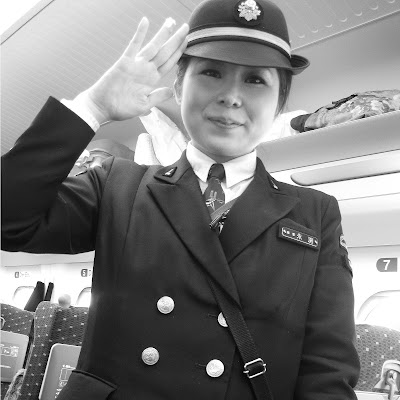In June the Flying Carpet
remembered amazing people
encountered in Japan in May
At the Meiji Shrine in Tokyo
the Flying Carpet
asks these Gothic Lolitas
if it's okay to take their picture.
They say,
"hai!"
in a shy but delighted way
At her home in Tokyo
author, collector, and folk art champion
Amy Katoh
speaking of objects made by hand
says,
"You can hear the voices
of the people who made them
when you use them"
On the Shinkansen Bullet Train
from Tokyo to Kyoto
the young lady
says,
"Your ticket, please"
and salutes us when we take her picture
At Aizenkobo in Kyoto
Utsuki-san, indigo dye artist
says,
"Many people help us.
If we tied all the shibori knots ourselves,
we would never sleep
and we would be dead."
At Yakimono Gallery in Kyoto
Robert Yellin, Japanese ceramic aficionado
says,
"Japanese ceramic artists
have clay in their veins."
At his very Meiji home and gallery in Kyoto
Shotei Ibata-san, calligrapher extroidinaire
says,
"Action painters
could see the relationships
of Japanese calligraphy
to zen, jazz, abstract expressionism...
being in the moment..."
At Heihachi-jaya in Kyoto
Hozan Murata-san, shakuhachi flute master
says,
"Playing the shakuhachi
can be a meditation.
It can calm the spirit."
At Nanzenji Monastery in Kyoto
Shuren Sakurai-sensei, Buddhist priest and Noh mask carver
says,
"If you want to make something good,
it's the real thing.
It takes time and great effort.
The person who made it put their face into it."
At Zuiho-in Subtemple of Daitokuji Monastery in Kyoto
Shodo Maeda-sensei, Buddhist abbot and tea master
says,
"You have come here to pay respect.
Take a great breath of air.
There's 450 year old air here
to breathe in and appreciate."
At the Mori family indigo dye center in Shigaraki
Mori-san, indigo dyer and restoration expert,
says,
"Indigo is alive."
At his studio in Kyoto
Hiroshi Saito-san, artist of hand painted fabrics
says,
"The important thing is to laugh."
He tells us of his aid work gathering
1200 sewing kits for the people of Tohoku
who survived the tsunami
so "they can come together
to make crafts like they did in the past...
the healing power of
the people making a quilt of butterflies...
each one honoring a person, a cat, a dog...
Japanese people have good hands."
Special thanks to these people who have opened their hearts.











